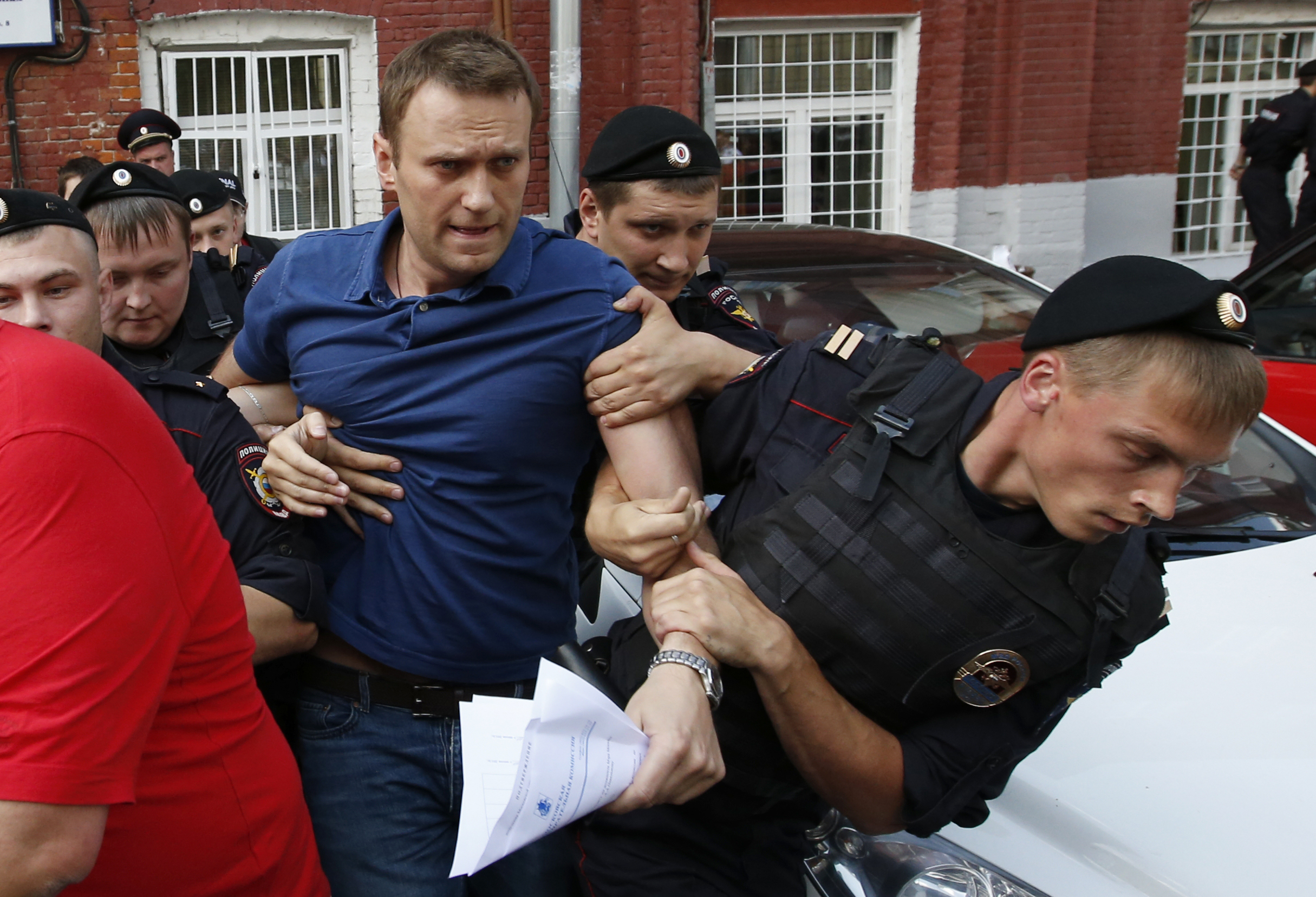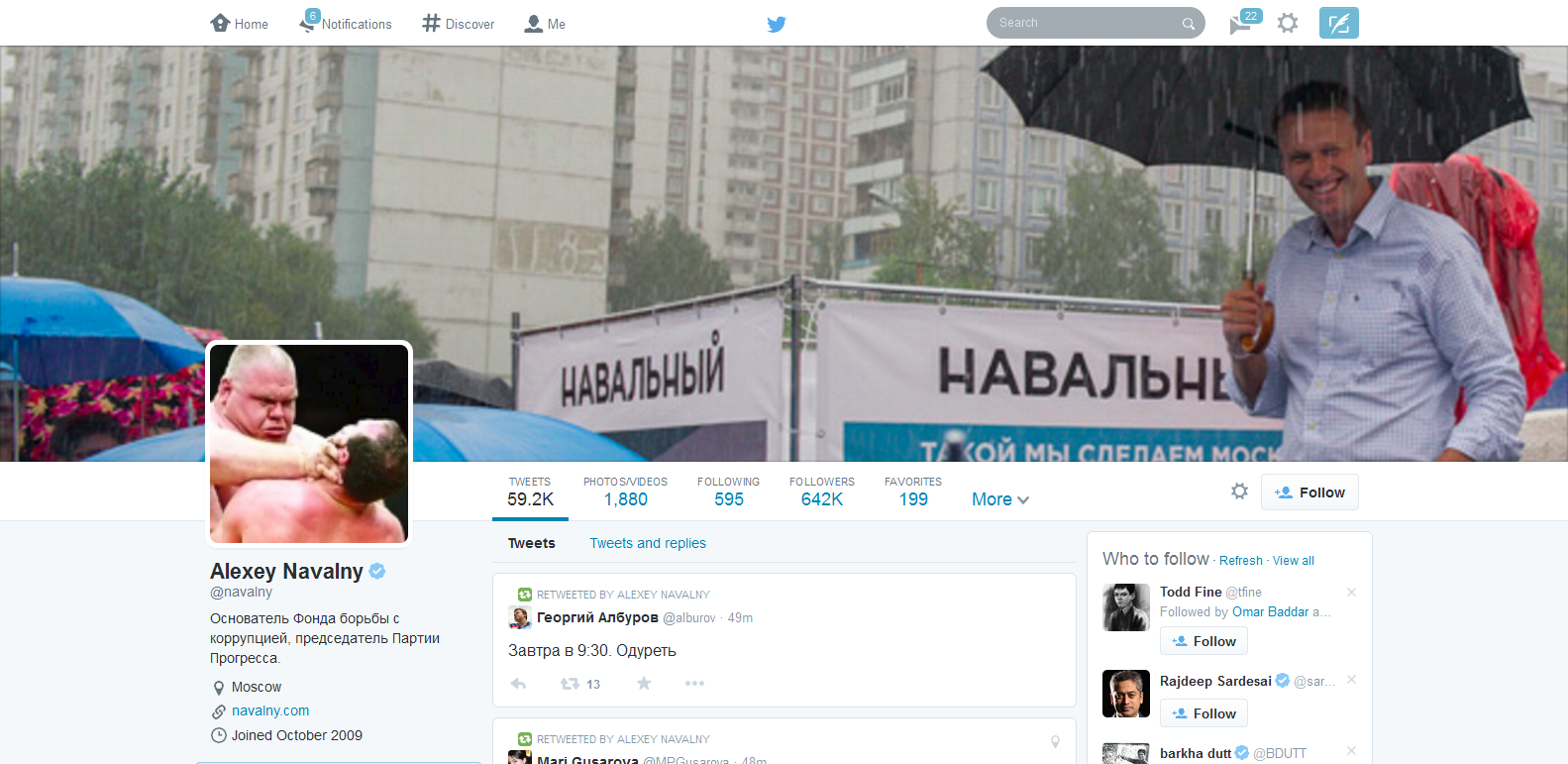
Policemen detain Russian opposition leader and anti-corruption blogger Alexei Navalny (C), after he visited the city’s election commission office to submit documents to get registered as a mayoral election candidate, in Moscow July 10, 2013. Protest leader Alexei Navalny vowed he would destroy the political system under President Vladimir Putin that was “sucking the blood out of Russia”, after state prosecutors demanded he be jailed for six years on theft charges. Other opposition figures say the trial was intended to prevent Navalny from fulfilling his dream of becoming president and, before that, running for Moscow mayor in September. Navalny was detained on a charge of organizing an unsanctioned rally near the city’s election commission office and was then released in less than half an hour. REUTERS/Grigory Dukor
Russia’s State Duma has just adopted a new bill which if enacted would broadly restrict the rights of all high-profile bloggers and social media users by treating them, in essence, as mass media outlets.
The new law, billed as a measure against terrorism, will apply to anyone whose blogs or personal websites attract 3,000 or more viewers a day. It passed a second reading by lawmakers this week and is expected to be adopted next week and handed to Russian President Vladimir Putin for signing.
If all goes according to plan, bloggers would be mandated to publish their last names and initials, as well as their email addresses. They would also be required to register with the government and follow the same rules as any other media outlet, i.e., verify the accuracy of anything they publish and set age guidelines for content.
Violators will face fines with a fine of as much as $1,000 for individuals and $10,000 for “legal entities.” Repeat offenders would have their site’s suspended.
Local media says the purpose of the bill is to ensure that blogs and other personal websites are not used to commit crimes, divulge state secrets or promote extremism, pornography or violence. Bloggers would also be banned from using foul language.
According to Russia’s state news agency ITAR-TASS, the bill is “half-baked,” “leaves many legal loopholes unplugged” and is facing considerable criticism inside Russia.
“The real purpose of the bill is to prevent any criticism of the authorities,” the agency quotes Ilya Shablinsky of Russia’s Presidential Council on Human Rights as saying.
The Committee to Protect Journalists (CPJ) expresses similar concerns and is calling on President Vladimir Putin to veto the bill. “The broad restrictions laid out by this legislation invite both its abuse by Russian authorities to silence their critics and self-censorship on the part of bloggers in order to avoid potential repercussions,” said CPJ Europe and Central Asia Program Coordinator Nina Ogniavoa.
If enacted, the bill would go into effect August 1, 2014.

Screenshot of Alexey Navalny’s Twitter page.
This news coincides with reports that a Russian court has found opposition leader and Putin critic Alexei Navalny guilty of slander and fined him $8,400 in a ruling observers say could potentially lead to time in jail.
Navalny is a popular blogger whose posted allegations of corruption among government elites. He emerged from 2011-2012 protests against Putin as the main leader of the opposition and a potential political rival to Putin in 2018 elections.
Navalny is already serving a five-year suspended sentence on a theft conviction that will prevent him from running in the 2018 presidential vote. He has also been charged with theft and money-laundering in a separate case that will soon go to trial.
In 2012, TIME Magazine named Navalny one of the world’s 100 most influential people. The same year, Foreign Policy named him one of the globe’s top thinkers.

3 responses to “Russia: Cracking Down On Dissenting Bloggers”
[…] this week, Russia’s State Duma passed a bill that, if signed into law by Putin, would require bloggers with over 3,000 daily viewers to register […]
[…] protesters’ private information to Russian authorities. Also this week, Russia’s State Duma passed a bill that, if sealed into law by Putin, would need bloggers with over 3,000 daily viewers to register […]
I almost never leave a response, but I browsed some remarks here Russia:
Cracking Down On Dissenting Bloggers